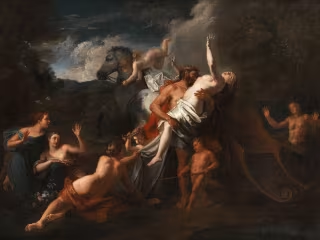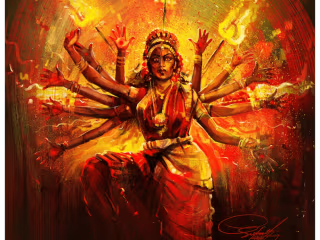Fortuna: Goddess of Luck, Abundance, and Fate
0
Ghostwriter
Blog Writer

Deeply ingrained in the hearts and minds of the ancient Romans was Fortuna, the goddess of destiny, luck, and fate. All felt her omnipotence as she guided the paths of mortals toward their ultimate futures. From the grandest emperors to the humblest peasants, all sought to appease her, imploring her to grant them good fortune in their endeavors. The diverse nature of Fortuna is exemplified by the plethora of myths, legends, and cultural practices that have endured through the ages, each adding to her expansive influence. Her power was awe-inspiring and humbling, as the Romans knew that no matter how hard they worked, it was ultimately up to Fortuna to determine their fate.
Overview of Fortuna
Fortuna, a prominent figure widely acknowledged as the Roman goddess presiding over matters of luck and fortune, held a pivotal and intricate role in the lives of ancient Romans, imprinting an enduring impact upon their comprehension of destiny and its nuances. Derived from the Latin word “fortis,” meaning strong or powerful, Fortuna embodies the potency and influence inherent in fate and luck, affirming the Romans’ profound regard for her. Her character became inextricably woven into the tapestry of life’s fluctuations, adeptly steering the tumultuous voyage of human existence through crests of success and troughs of adversity (“Fortuna”).
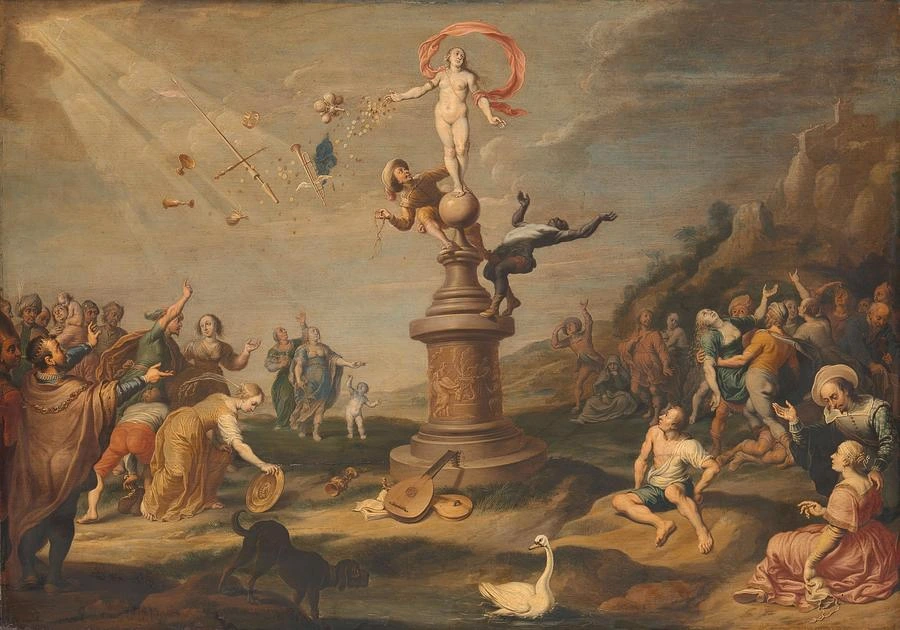
Source: Fine Art America
Titles
Bestower of Good Fortune
Goddess of Fate
Mother of Abundance
Guardian of Travelers
Abilities
Fortuna is widely known for her diverse and potent abilities that resonate deeply within the lives of individuals and the broader empire (Love et al.) Her dominion extends beyond mere luck, encompassing the profound capacity to shape destinies with far-reaching consequences. The intricate balance between bestowing prosperity and invoking adversity underscored her role as a formidable force in determining the outcomes of human endeavors and ventures. As a result, Fortuna was a figure of great importance, commanding respect and awe among those who sought her favor. The intricate mythology surrounding Fortuna’s powers has fascinated many historians and scholars, who have delved into the nuances of her teachings and rituals in great detail. Her influence on ancient Roman society is a testament to the power of belief and the enduring legacy of a timeless deity.
Characteristics
The artistic portrayal of Fortuna encapsulated the enigmatic essence of fate.. Throughout history, renowned artists have depicted her as a veiled figure, shrouding her countenance to underscore the hidden facets of fortune’s influence. Draped in robes that flowed like the winds of change, she visually embodied the ethereal quality of unpredictability. This veiled appearance was a powerful metaphor, illustrating the uncertainty inherent in human lives. Botticelli’s “Fortune” is a notable painting that portrays her blindfolded, capturing her impartiality and the capriciousness of her favor (Love et al.). In essence, the artistic representation of Fortuna highlights the mercurial and impartial nature of fate, reminding us that the future is always uncertain.
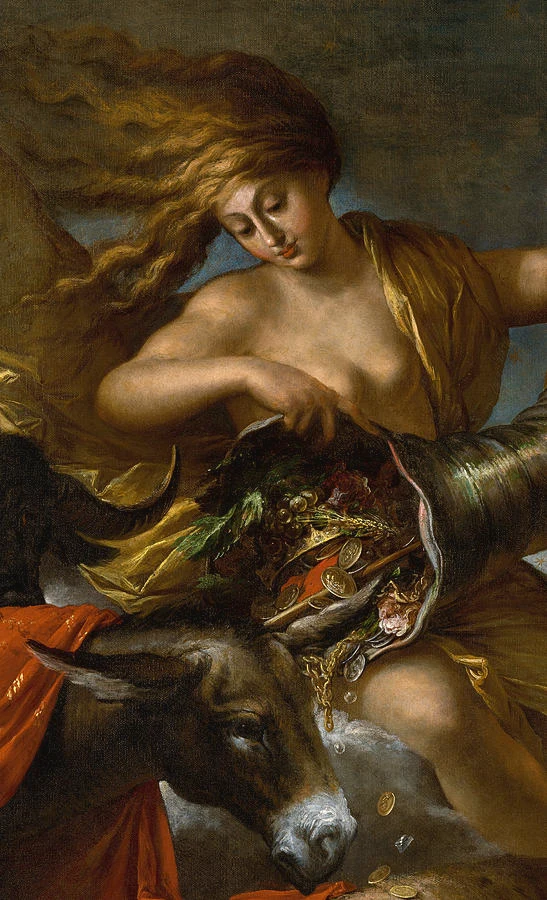
Source: Pixels
Traits
Fortuna’s character encompassed a complexity that mirrored the myriad roles she assumed (bjwanamaker). Her temperament lay somewhere between generosity and fickleness, benevolence and severity. This intricate blend reflected the complexity of human existence, where joy and sorrow often intertwined in unforeseen manners. Fortuna’s favor was not solely dictated by her impulsiveness; the devotion and reverence bestowed upon her by mortals also played a pivotal role in soliciting her grace.
Symbols
Fortuna’s influence is reflected through various symbols representing her diverse facets. One such emblem is the “Rota Fortunae,” or wheel of fortune, an enduring symbol intricately linked to her essence. This perpetual wheel, depicted in art across eras, encapsulates the cyclic nature of life’s fluctuations, underscoring the capriciousness she embodies. Noteworthy paintings, like Dosso Dossi’s “The Wheel of Fortune,” depict this emblem, conveying the fickleness of fate (“Fortuna: Roman Goddess of Luck”).
In addition, the Cornucopia, a symbol of abundance and opulence, epitomizes Fortuna’s role as a bestower of life’s riches. This motif found resonance in literature, like Petrarch’s writings, underscoring the alignment of her favor with prosperity. Nautical symbolism, encompassing ships and navigational tools, pays homage to her guidance over journeys, as showcased in ancient reliefs from Ostia (“Fortuna”).
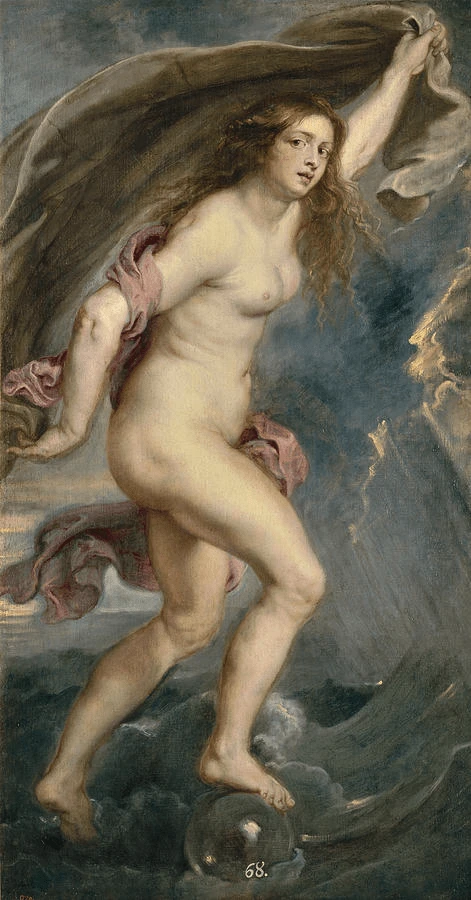
Source: Fine Art America
Festivals and Rituals
The annual March 1st festival known as the “Feriae Latinae” was a significant event that elevated the influence of Fortuna, the goddess of luck and fate. The Romans held this ceremonial affair to honor Fortuna’s auspicious power and secure her benevolence for the forthcoming year. Through a medley of rituals, the people expressed their ardent aspirations to seek her blessings and favor for their ventures and undertakings. Dedicated temples like the Temple of Fortuna Virilis served as hallowed havens for worship and supplication, further emphasizing the profound intertwining of faith and practice in shaping the lives and aspirations of the ancient Romans. Fortuna played a deeply ingrained role in the people’s lives, and the Feriae Latinae festival stood as a testament to this (“Fortuna: Roman Goddess of Luck”).
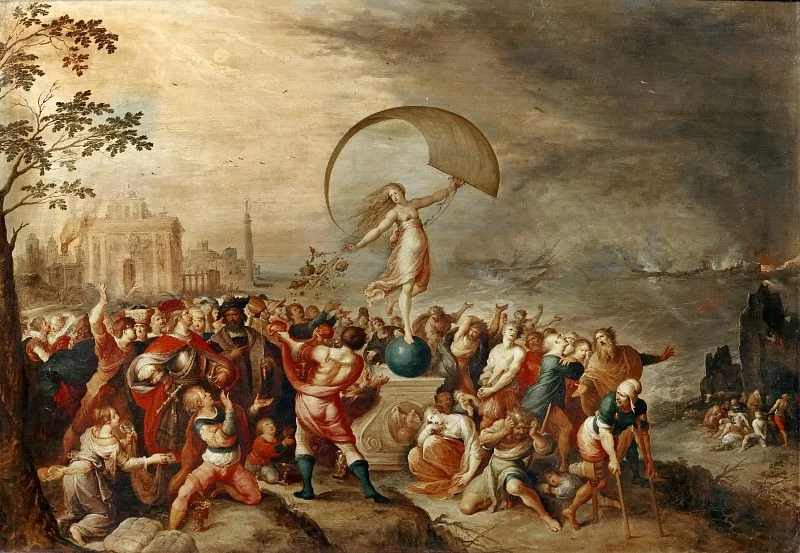
Source: Thoughts on Papyrus
Legends associated with Fortuna
Fortuna, the Roman goddess of luck, fate, and fortune, remains a captivating figure whose presence resonates through myths, legends, and cultural contexts. Her multifaceted nature has shaped the ancient understanding of destiny and fascinates scholars and enthusiasts alike. In this exploration, we delve into the captivating legends of Fortuna, tracing her origin story, unveiling diverse narratives that influenced her depiction, and discussing the interplay of other religions on her recognition. Join us on a journey through time and discover Fortuna’s enchanting world and the myths surrounding her.
Origin story
Fortuna’s mythological figure has been a fascination for scholars and enthusiasts alike, with a plethora of intriguing variations in her origin story. Among them, a prevailing narrative offers profound insights into her divine essence. According to some accounts, Fortuna is the offspring of Jupiter and the Titaness Themis, an ancestry that marries celestial authority with cosmic harmony (“Fortuna”). This lineage befits her as the goddess of luck, fortune, and destiny.
On the other hand, alternative renditions paint a different picture of Fortuna. Many believe Fortuna emerged from the sea, embodying the erratic ebbs and flows of life’s fortunes (Love et al.). This version highlights the mercurial nature of Fortuna’s influence, which can be both benevolent and malevolent depending on the whims of fate. Regardless of the variation, Fortuna remains a potent symbol of the unpredictability of life and the power of fate to shape our destinies.
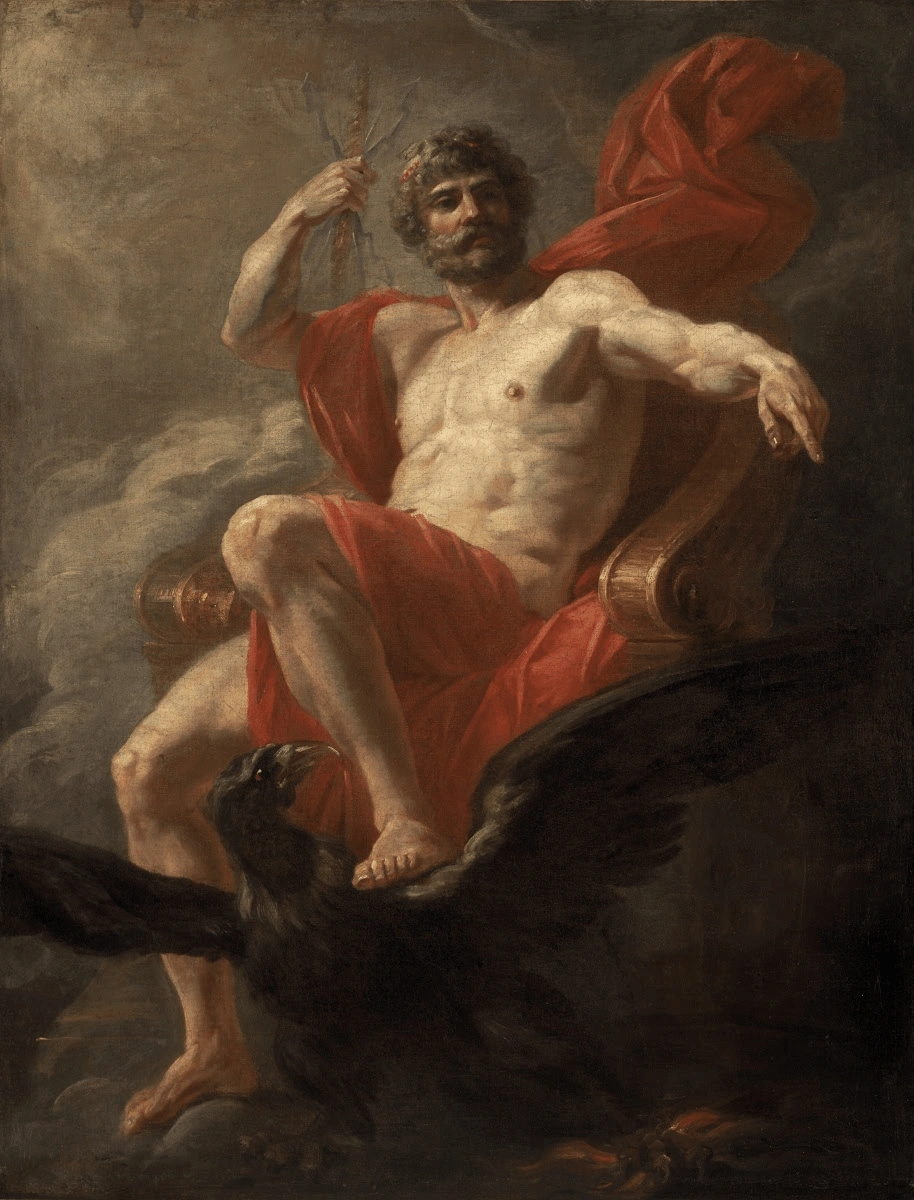
Source: Google Arts & Culture
Finding Solace in Fortuna: Boethius’s Journey
The historical account of Boethius, a renowned philosopher and statesman in ancient Rome, reveals a notable crisis he faced when imprisoned due to political circumstances. Despite holding a high position within the Ostrogothic court of King Theodoric in the early 6th century, Boethius was accused of treason and conspiracy against the king, subsequently leading to his arrest, imprisonment, and eventual death sentence.
During his time in confinement, Boethius sought solace in philosophical contemplation, struggling with the injustice of his situation. It was within this context that Fortuna’s role in his life became significant. In Boethius’s work “Consolation of Philosophy,” he dialogues with Lady Philosophy, who appears to him as a divine figure embodying wisdom and reason. Fortuna, also personified, interacts with Boethius as a compassionate deity who offers him solace and guidance (Love et al.), encapsulating the dual nature of Fortuna as a mercurial bestower of luck intertwined with her benevolent aspect. This narrative highlights Fortuna’s presence as a guiding force that provides solace and guidance amidst life’s unpredictable twists. The story underscores her role as a deity, not solely responsible for random outcomes but as a compassionate influencer shaping the human journey through its myriad ups and downs.
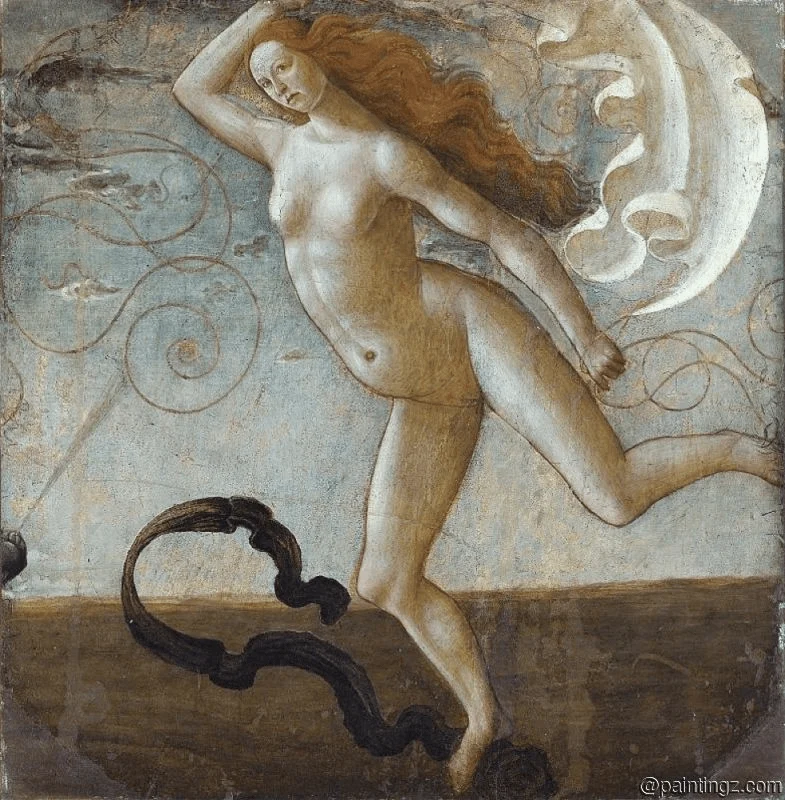
Source: Paintingz Custom Paintings
The Divine Protector of Navigators in Ancient Rome
The enduring legend of Fortuna positions her as a vigilant guardian of navigators, solidifying her significance as a divine protector during perilous maritime journeys (“Fortuna: Roman Goddess of Luck”). In the naval hub of ancient Rome, sailors revered Fortuna’s guiding influence, believing invoking her favor could avert storms and safeguard them from treacherous waters. This profound association with seafaring pursuits illuminated Fortuna’s multifaceted nature as she transitioned from a deity symbolizing the capriciousness of fate to an essential patron of maritime endeavors. This nautical legend underscores her adaptability as her benevolent sway extended beyond terrestrial matters to encompass the unpredictable realms of the sea. Fortuna’s evolution into a guardian of navigators highlights the dynamic ways in which her character resonated with diverse aspects of human existence, encapsulating the interconnectedness of fortune and survival on both land and sea.
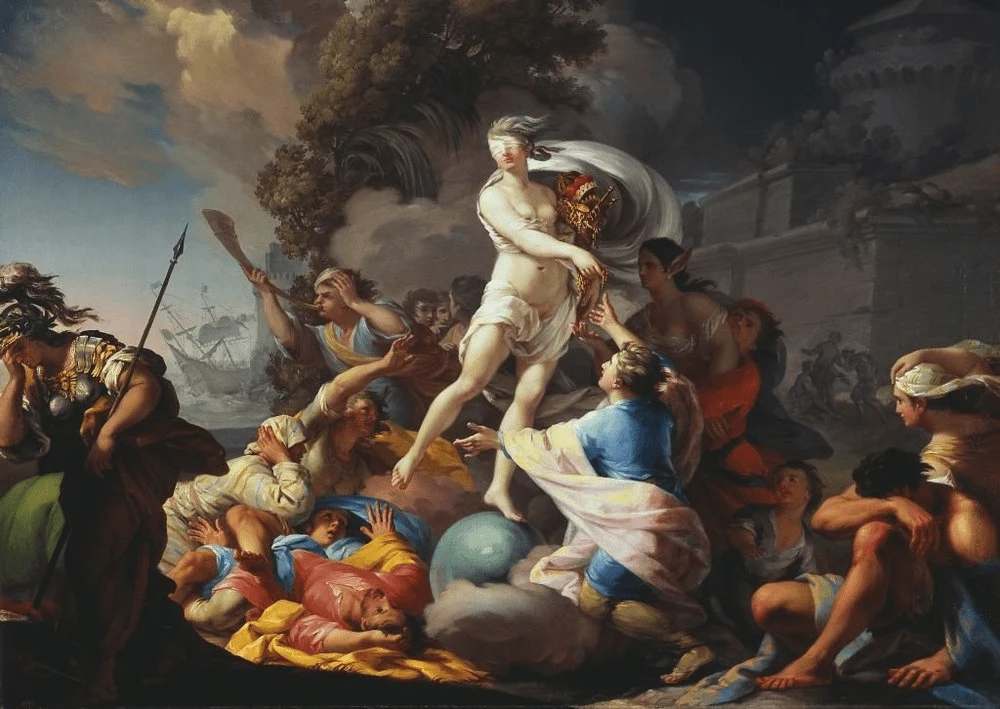
Source: romepix
Influences of other religions/cultures on Fortuna
The assimilation of the Greek goddess Tyche into the narrative of Fortuna is a significant manifestation of the intricate interplay of ancient belief systems (“Fortuna”). This convergence broadened the identity of Fortuna and blurred the boundaries between distinct deities, resulting in the merging of their attributes and narratives. As the characteristics of Tyche intertwined with those of Fortuna, a richer and more complex persona emerged, embodying the shared human fascination with luck, fate, and fortune. This assimilation serves as a testament to the interconnectedness of ancient cultures, highlighting the fluidity of belief systems and their ability to cross cultural borders. The story of Fortuna vividly illustrates how mythologies evolve, adapt, and intermingle, resulting in a more intricate and nuanced understanding of the divine.
Modern appearances
The enduring influence of Fortuna transcends time and continues to exert its presence in contemporary contexts through various expressions. Dating back to ancient times, Fortuna’s significance has been adapted to the modern era, personified through a delicate balance between chance and fate (Love et al.). The world of Tarot cards provides a space where Fortuna’s essence intertwines with the unpredictable and the planned, positioning her as an arbiter of destiny. This enduring symbol within the realm of divination underscores her timeless role as a powerful force shaping one’s life, cementing her place in the annals of history.
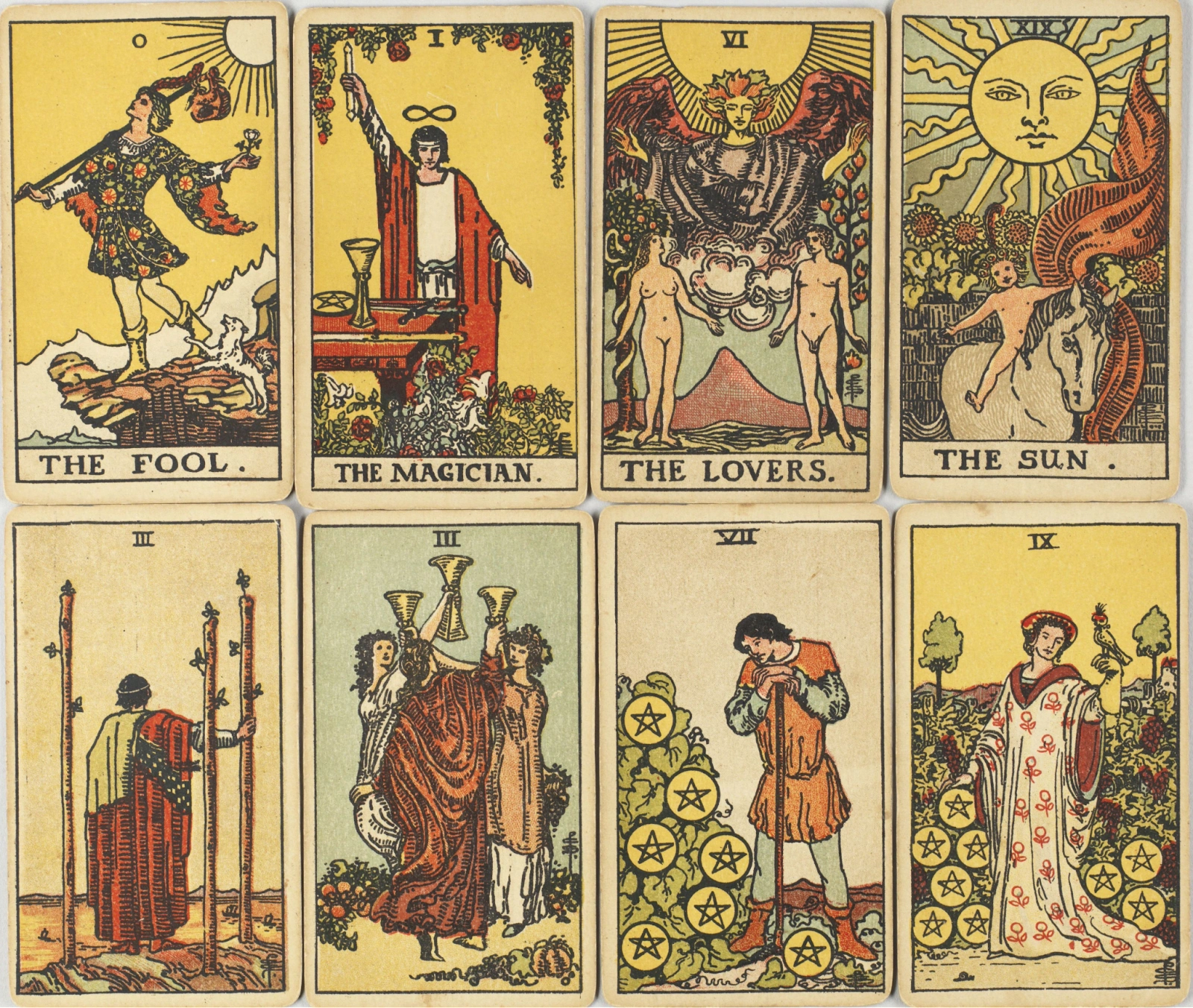
Source: CNN
Final thoughts
The legends surrounding the goddess Fortuna are as diverse and complex as the human experience. The origin stories of the goddess of luck and her numerous manifestations in myth and legend reveal an intricate and multifaceted character that has resonated throughout the ages. Indeed, her enduring significance as a symbol of life’s uncertainties, the interplay of fate, and the ever-changing currents of human existence have captured people’s imaginations across cultures and generations. By exploring the varying interpretations of Fortuna, we can gain a deeper understanding of the human condition and life’s enduring mysteries. By examining such rich and varied lore, we may appreciate the intricacies of the human experience and the timeless truths underlying our existence.
References
bjwanamaker. “Fortuna, Goddess of Chance and Fate.” Women in Antiquity, 31 Mar. 2017, womeninantiquity.wordpress.com/2017/03/31/goddess-fortuna/.
“Fortuna.” Wikipedia, 28 Mar. 2022, en.wikipedia.org/wiki/Fortuna.
“Fortuna: Roman Goddess of Luck.” The House of Good Fortune, www.houseofgoodfortune.org/bonheur-blog/fortuna-roman-goddess-of-luck. Accessed 30 Aug. 2023.
Love, Butterflies in Folklore:, et al. “Meet Fortuna, Goddess of Luck, Abundance, and Fate.” Icy Sedgwick, 7 Mar. 2020, www.icysedgwick.com/fortuna/.
Did we miss something? Do you know another aspect of this legend? Don't hesitate to reach out!
Like this project
0
A client hired me to write several informative pieces on Roman Goddesses, and this blog post centers around the Goddess of Luck and Fate, Fortuna.
Likes
0
Views
451
Tags
Ghostwriter
Blog Writer




